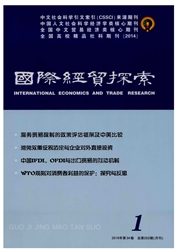

 中文摘要:
中文摘要:
基于中国CGE模型,文章解析了劳动力市场分割对中国农产品贸易自由化福利效应的影响。研究结果表明,劳动力市场分割诱发的资源配置扭曲会对生产效率造成负面冲击,并导致劳动力、资本和土地要素收益率的下降;在资源配置扭曲的情形下,降低农产品关税的贸易自由化政策将导致国民福利损失,并加剧中国农村和城市居民的收入分化。政策含义为,提升劳动者人力资本、消除户籍制度等制度性障碍有助于国民福利的增进与收入差距的缩小。
 英文摘要:
英文摘要:
Using China CGE model, this paper examines the welfare effect of China’s agricultural trade liberalization under labor market segmentation. The result shows that the resource allocation distortion induced by labor market segmentation has a negative impact on the production efficiency of China, which leads to a decline in labor, capital and land yields. Due to the resource allocation distortion, the agricultural trade liberalization policy would lead to the loss of national welfare as well as the increase of income gap between rural and urban residents in China. Its policy implication is that, to enhance national welfare and narrow income gap, it is urgent to improve the human capital of workers and eliminate the institutional barriers such as household registration system.
 同期刊论文项目
同期刊论文项目
 同项目期刊论文
同项目期刊论文
 期刊信息
期刊信息
